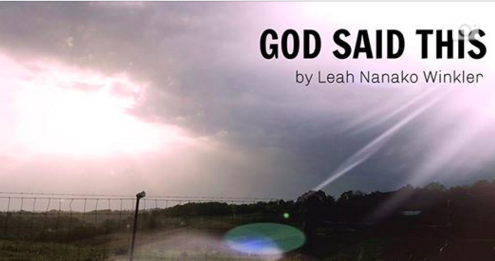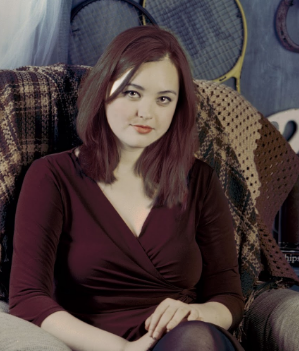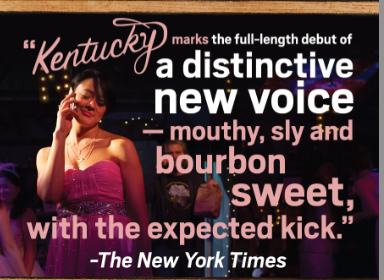By William McCann
Special to NKyTribune
Leah Nanako Winkler, formerly of Lexington but a playwright now living in New York, is on the verge of joining an exclusive ‘club’ of talented Kentucky playwrights to have success on the New York theatre scene.
Indeed, New York in recent years has had a heavy dose of “Kentucky” influence with plays by living Kentucky playwrights with productions on and off Broadway: Marsha Norman, George C. Wolfe, Naomi Wallace, and Suzan-Lori Parks have all experienced success with Pulitzer Prizes, Tony Awards and other recognitions announcing their talents to the world.

Leah Nanako Winkler (Al Seib / Los Angeles Times)
This year Leah Nanako Winkler by winning major awards and having her play God Said This accepted by Actors Theatre of Louisville may well have stepped on to the golden path that may lead her to that same recognition and success.
On October 25th the Actor’s Fund and Playwrights Horizons pronounced her the winner of the first annual Mark O’Donnell Prize. The award, which recognizes an emerging theatre artist, comes with $25,000 and developmental support that includes one week to prepare a reading of a new work.
In November her play God Said This was announced as being part of the 42nd Humana Festival of New American Plays. The Actors Theatre website gave this synopsis of the play: “With her mom undergoing chemotherapy, New York transplant Hiro returns home to Lexington, Kentucky after years away. Sophie, her born-again Christian sister, fights to maintain her faith amid adversity. James, their recovering alcoholic father, wants to repair his fractured relationship with his daughters, but redemption isn’t easy. And John, an old classmate and single dad, worries about his legacy. Wry and bittersweet, God Said This is a portrait of five people confronting mortality in very different ways—and unexpectedly finding that their struggles bring them together.” God Said This is to be directed by Morgan Gould and runs February 28 – April 8.
Then in early December the Lark announced that the Jerome Fellowship for the years 2017-2019 had been awarded to Winkler for the purpose of providing assistance to her in the development of a new play.
Finally, only days ago, Chicago Tribune freelance critic Kerry Reid listed her play Two Mile Hollow produced locally by First Floor Theater as one the city’s best plays of 2017 by saying “Winkler’s satire is about “a dysfunctional — and utterly clueless — rich white family [that] gathers at the ancestral beach house to hash out old grievances. The kicker is that actors of color play all the roles, creating a burning lens on white privilege that could ignite concrete.”
Earlier this month, after hearing of her most recent award the Jerome Fellowship, I wrote Ms. Winkler to ask if she would be willing to do an email interview with me about her career so far and to discuss her involvement with this year’s Humana Festival of New American Plays at Actors Theatre of Louisville.

Following is a transcript of the email interview I had recently with Ms. Winkler. A few edits have been made for reasons of brevity or clarity, otherwise the interview is as each of us wrote our parts of the dialogue.
Q.: Congratulations on a truly outstanding career, for representing Kentucky and, I suspect Japan, so well.
LNW: Thank you!
Q.: I am sorry to say that at this point I have read about you and your plays, but have not seen them. Luckily, that will change early next year when I will have the opportunity to see God Said That at the Humana Festival.
LNW: Yes, I’m very excited about being at Humana this year. God Said This is set in Lexington so it’s very exciting to be able to see the play in Kentucky before it’s in NYC.
Q.: Your web page says, “Leah Nanako Winkler is a Japanese American playwright from Kamakura, Japan and Lexington Kentucky.” How do you balance (or do you) your dual identities as being from both Japan and Kentucky/USA?
LNW: I’m mixed race, so both of those identities are mine. I don’t really think of it as a balancing act. There are also a lot of Japanese people in Kentucky and I grew up going to the Central Kentucky Japanese School on Saturdays where my mom still teaches. So for me- that’s a huge part of Kentucky, too.
Q.: Your plays reflect your ethnic identities. At the same time, the plays I am familiar with, seem to be written in the western dramatic tradition. How–if at all– have the theatre traditions of Japan, such as Noh and puppetry, been reflected in your work?
LNW: Haha I don’t write Noh or Kabuki or anything like that (though I went and saw some Bunraku theater with my mom when I was in Japan and it was super cool).
Although you’re right in that my writing is extremely varied, veering from semi-autobiographical fiction to the satirical. I think the common thread is definitely humor, and even my dramas have strong elements of comedy
God Said This coming up at ATL is about cancer – but it’s often funny because I believe pain is funny especially if it’s truthful and especially if it’s in retrospect.
I do tend to cast AAPI [Asian American and Pacific Islander] women in my plays, but I specifically do not write characters who are defined by their ethnicities. A protagonist can be an Asian American woman without it being “about” that because everyone is a person who goes through journeys people can relate to regardless of race. I do have a play about a Japanese Robot but thematically that’s more about the integration of technology into our often mundane lives.

Q.: What playwrights or writers have influenced your works?
LNW: Thornton Wilder, Mark O’Donnell, Young Jean Lee, Caryl Churchill, Will Eno, and a lot of my peers who I have gone through writers groups and fellowships with 🙂
Q.: What is Kamakura Japan like? How is that community reflected in your works?
LNW: It’s not. I have never written a play about Kamakura but I go back there when I visit and it’s beautiful- a mix of the traditional and modern. I spend most of my time there hanging out with family and eating though. Just normal stuff.
Q.: You also hail from Lexington, KY. That city is clearly in your plays– most recently in your play, God Said That. Why Lexington?
LNW: So, my mom was undergoing chemotherapy treatments at (the University of Kentucky’s Markey Cancer Center this past spring/summer and I wrote the play there. Watching someone get chemo isn’t super eventful like in the movies. You watch them sleep most of the time.
So I brought my laptop and asked myself what would happen if the Rose Family — which is the same family I wrote about in my [off-Broadway] play Kentucky — faced cancer? This play is a result of that. However, it doesn’t mean any events in the play actually happened or that this is a sequel on my play Kentucky – which was a totally different piece about a wedding with sixteen-person ensemble cast (this play has 5 characters and is a stand-alone piece. You don’t have to have seen or read Kentucky to follow it at all).
Q.: Kentucky is described on Ms. Winkler’s website as being about Hiro, a self-made woman making it in New York. But she is also single, almost thirty and estranged from her dysfunctional family who lives in Kentucky. When her little sister, a born-again Christian, decides to marry at twenty-two, Hiro takes it up on herself to do whatever she can to stop the wedding and salvage any shred of hope she had about her sister’s future. The themes of identity, religion and love collide in this unique coming-of-age story.
LNW: These two plays are set in Lexington because that’s just where the Rose’s are from. I also think the entire country has its eyes on Red States post-Trump and I want to depict characters who aren’t stereotypically what you think of when you think of Kentucky.
For example, one of my high school friends let me interview him about life in Lexington. He ended up inspiring me to write a heightened version of him as a supporting character in God Said This and a lot of the conversations in the play between him and another supporting character — who actually isn’t based on me even though people will think it is because she’s half-Asian — were based on his insights. Our conversations really made me realize how misrepresented and often misunderstood people in town are. He’s a really smart, cool dude with an MBA and so is the character — and I feel that Kentucky people are often written in other plays as uneducated hillbillies who are stupid and racist.
Q.: When and how did you first become interested in theatre? Did you start as a an actor? Backstage? Or maybe as a playwright?
LNW: I was a little aimless as a young teen but I found a sense of home in the very first drama class I took in the public school system. The teacher was and is truly amazing — we were so lucky.
Then I started trying out for the plays and the very first one I was in was Bill Irwin and Mark O’Donnell’s adaptation of Scapin where I played a gendarme with no lines. That was the first play I really fell in love with. I found out that plays could be funny and smart and the experience impacted my life in such a positive way. Then, amazingly, this year I received the very first Mark O’Donnell Award in playwriting. It felt very surreal that it happened that way.
Q.: Where did you go to high school? I think I heard Lafayette, SCAPA?
LNW: Tates Creek High School! . . . . Seriously, creek dawg for lyfe.
Q.: What college or other post-high school playwright training or opportunities have you had?
LNW: I attended Butler University thanks to my involvement in high school theater (I really don’t know if I would have gone to college otherwise) and am currently finishing up my masters at Brooklyn College under Erin Courtney and Mac Wellman.
There was a nine-year gap for me between undergrad and graduate school- so I feel like my voice as a playwright was developed heavily on the job through blood, sweat, trial and error.
I’ve also learned a lot by being in various writers groups/residencies in the city — namely Youngblood at the Ensemble Studio Theater, which is a fellowship for professional writers under 30 (I’ve aged out of it now though).
I also had my own theater company for the first five years I lived in New York and learned an insane amount. Right now I’m a Time Warner Fellow at the Women’s Project Theater, a labbie at Ma Yi Theater and a member of the Dorothy Streslin New American Writer’s group at Primary Stages.
Q.: Ms. Winkler’s theater company’s was Everywhere Theatre Group. For five years, ending in 2012 the company did one or shows each year. Two of the plays produced included an ensemble piece called The Internet; the most controversial one was Flying Snakes in3-D!!!
LNW: All of those groups inspire me in so many ways — and it’s great to be around other playwrights and theater makers who work so hard. It prevents me from being lazy (most of the time!).
Q.: What was your first production like? After years of writing and submitting what was it like to be taken seriously as a playwright, for you to sit and listen to actors read your words aloud, to be in rehearsal and see your words and ideas brought to life?
LNW: Technically, my first production was in Indianapolis when I was nineteen or twenty? It was an experimental piece called Everywhere that was part of the Indianapolis Fringe Festival at the New Art Theater. I remember it being the most exciting thing ever! I also directed it and worked with a group of musicians.

But in New York, my very first production was at the Brick Theater in 2007 and I co-produced it with my own theater company. It played to an audience of maybe 6 to 9 people a night and I did all of the scene changes myself. It didn’t matter though, because I felt like I was doing something and learning about my voice as an artist and how I work as a collaborator. I worked this way for a long time and steadily built an audience independently.
However, it wasn’t until about two years ago that I started to get institutional support and getting an Off-Broadway premiere was definitely next level. It’s a great feeling to reach wider audiences and have an entire staff that is so encouraging so that you can just focus on being a writer.
Q.: In working with directors have you ever had to “fight” to see your vision of particular work put on stage because someone other than yourself thought that they knew better than you what the play was about?
LNW: Nope. I would say playwrights have a lot more power than in TV or film and often, collaborators are working hard to execute your vision. However, since I used to be a director I know how hard it is and I think I’m a little more loose than some other playwrights. I think theater is made as a team and I know I don’t always know best, so I value a sense of play in the rehearsal room and most of the experiences I’ve had with collaborators have been positive.
Q.: You’ve already won some prestigious awards and been nominated for still others. How have your awards and recognitions inspired or otherwise affected your career?
LNW: It’s impacted me in a huge way and changed my life immensely. For one, I do not currently need to work a day job and am a full-time playwright. This is invaluable because it lets me actually do what I love with my life.
Q: Besides your own hard work to whom or what do you attribute your success?
LNW: Collaborators who have elevated my work to the point where it’s become “our” work. Anyone who has ever believed in me enough to say yes. Youngblood at EST. Also I love my agents and managers — they obviously help a lot and I definitely wouldn’t be able to figure out a lot of this without them!
William H. McCann, Jr. a playwright, poet, editor, and publisher who edits the Kentucky Theatre Yearbook. He lives near Corinth.
























